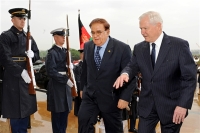WASHINGTON, May 11, 2010 — Senior U.S. and Afghan officials today agreed to explore ways to broaden and deepen defense cooperation between the two countries and establish a long-term partnership for the future, Pentagon Press Secretary Geoff Morrell said.
Defense Secretary Robert M. Gates today hosted Afghan Defense Minister Abdul Rahim Wardak, Interior Minister Mohammad Hanif Atmar and Afghan Intelligence Chief Amrullah Saleh during a 90-minute Pentagon meeting.
The meeting is part of a series of discussions between U.S. and Afghan officials built around Afghan President Hamid Karzai’s visit here.
“This is a very important week for our partnership, for our relationship,” Gates told the group at the top of the meeting.
Chairman of the Joint Chiefs of Staff Navy Adm. Mike Mullen, Michele Flournoy, the undersecretary of defense for policy; Army Gen. Stanley McChrystal, the U.S. and NATO commander in Afghanistan; and Mike Vickers, the assistant secretary of defense for special operations and low-intensity conflict, joined Gates and the senior Afghan officials in the meeting. Morrell said the meeting went well and there was broad agreement among the parties on the way forward in Afghanistan. “This is about, how do we build an enduring, long-term partnership with Afghanistan,” he said.
The two countries agreed to begin a regular, high-level defense dialogue, Morrell said. Details such as how often meetings are held and who the players are, he said, are yet to be worked out, but the agreement signifies the United States’ concern for Afghanistan and its desire to remain involved with that country.
“ ‘The relationship must be an enduring one; it is in our mutual interests to do this,’ ” Morrell quoted Gates as saying.
The officials discussed how the relationship should evolve. Gates believes that the relationship between the United States and Afghanistan must be enduring and not predicated just on the need to fight the current war. The United States, Morrell said, stands ready to continue training, equipping and advising Afghan security forces, and in assisting in counternarcotics and counterterrorism efforts long after the current conflict has been decided.
The United States wants to reassure the Afghan government that it “is not going to repeat the mistakes of the late ’80s and early ’90s, when we turned our back [on Afghanistan and Pakistan] and walked away from the relationships,” Morrell said. “I think there is clearly … a trust deficit … that clearly needs to be addressed.”
The group also talked about regional security and the evolving trilateral relationship among Afghanistan, Pakistan and the United States. They discussed developments of the Afghan security forces. Gates noted the success the Afghan security forces have had with increasing their numbers. “Obviously, there are quality issues that need to be addressed in the long term,” Morrell said.
The group also discussed the transition of security responsibility to Afghan forces. They discussed the July 2011 date that President Barack Obama has set to begin that transition. “Everybody was in agreement that transition was a process, not an event,” Morrell said. “July 2011 will be the beginning of a conditions-based process. But even as that process evolves, we will enjoy a robust military-to-military partnership well into the future.”
Source:
U.S. Department of Defense
Office of the Assistant Secretary of Defense (Public Affairs)

 von
von 
